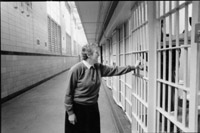|
Abraham House offers the incarcerated and their relatives a place of hope and community, where lives can be rebuilt, families mended, lessons learned, and men, women and children deeply marked by crime receive the spiritual, social and practical tools to become productive citizens.


Stefan Vanfleteren |
Abraham House was founded in 1993 by three Rikers Island
chaplains (who have more than 60 years experience at the prison) and Department
of Corrections personnel. Though the founders include a French worker priest
and Catholic nuns, Abraham House is non-denominational. The initial goal
of Abraham House was to break the cycle of recidivism (which is a disheartening
70% in New York State) with a demanding residential program that serves
no more than a dozen offenders at a time. These inmates are required to
finish their high school education, be counseled intensively for their problems,
learn to take social and personal responsibility, get a job and keep it.
Only one of the more than 100 graduates of the Abraham House Residents Program
has returned to prison for a second offense. |
Abraham House subsequently expanded its goal: to break the cycle of crime
in families, from grandparent to parent to child.
A Family Center was
added for men, women and children caught up in the criminal justice
system. Because of the stigma of serving time in prison, these people
are shunned in other communities. Abraham House, after fruitlessly
looking elsewhere in New York for a facility, eventually took root
in Mott Haven because it is a neighborhood where most people have been in
prison or have a family member who has served time.
In 1999, Abraham House added an After-School/Summer Program for the relatives
of inmates. Corrections systems in many states now find the single
greatest predictor of who winds up in prison is having a parent who
was incarcerated. These children are at the greatest risk of repeating
the cycles of destructive behavior.
|



